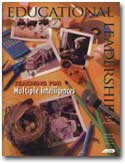What is the difference between learning styles and multiple intelligences? Visit the following sites on the World Wide Web and decide for yourself. Find ways to use both in the classroom. Maybe you will even end up chuckling.
Learning Styles
http://sunsite.unc.edu/jembin/mb.pl. Jonathan Magid has come up with a Web form to take the Keirsey Temperament Sorter, for personal use only, to roughly determine your Myers-Briggs Personality type. Are you introverted, extraverted, intuitive, judgmental, sensory, feelings-oriented? This is one of the most famous and controversial of the learning styles inventories.
http://www.virtualschool.edu/mon/Academia/KierseyLearningStyles.html. Charles Schroeder of the University of Missouri has written a thoughtful article about learning styles, with links to Web sources. At the bottom of this site, go back to the "Middle of Nowhere" for a fascinating glimpse at "Taming the Electronic Frontier."
http://www.d.umn.edu/student/loon/acad/strat/lrnsty.html. The University of Minnesota Student Handbook lists many sources on learning styles. A couple of links down on this UMN page, and you are at the University of Hawaii (http://www.hcc.hawaii.edu/hccinfo/facdev/lsi.html) with a Learning Style Inventory you can print out and take by old-fashioned paper and pencil.
http://shinbone.psych.brown.edu/sals/ldlinks.html. The Students with Alternative Learning Styles page shows that students with many types of "mild" disabilities have embraced learning-styles approaches as a way to accommodate their diverse needs. This page lists many links to alternative learning, including "A.D.D. from A to Z" and info for parents.
http://www.literacy.org. The National Reading Styles Institute site profiles Marie Carbo. See Educational Leadership (March 1997) for her article, "Reading Styles Times Twenty." Take a reading styles test and find information on conferences and training.
Multiple Intelligences
http://pzweb.harvard.edu/HPZpages/Whatsnew.html. What's New at Project Zero? This site is new! With Howard Gardner as the director, Project Zero's mission is "to understand and enhance learning, thinking, and creativity in the arts and other disciplines for individuals and institutions." Here are a few projects (with links provided on this site): APPLE Project: Assessing Projects and Portfolios for Learning; Arts PROPEL; ATLAS Communities; Concordia Project; Lincoln Center Institute Project; Multiple Intelligences Schools; Project MUSE (Museums Uniting with Schools in Education); and Smart Schools (with Project Zero co-director David Perkins).
http://www.indiana.edu/~eric_rec/ieo/bibs/multiple.html. This ERIC site has links to other multiple intelligences pages, plus abstracts of books and articles on the subject by Thomas Hoerr, Robin Fogarty, Carolyn Chapman, Jean Smerechansky-Metzger, Thomas Armstrong, David Lazear, and others.
http://www.ascd.org. ASCD has many resources on multiple intelligences and learning styles. Do a search; but first, click on PD (Professional Development) Online, Multiple Intelligences, create your own password, and take an online course, complete with audio clips from Gardner and Robin Fogarty.
http://www.firn.edu/~face/about/dec95/mult_int.html. With a caution against labeling students, Jack Edwards of the Florida Association of Computers in Education explores which types of technology might be appealing to students with strengths in the various intelligences. Some might be obvious, such as the use of computer drawing programs for students with visual-spatial talents; but would you have thought of videodisc and bar code programs for children with verbal-linguistic strengths? "Multiple Intelligences and Technology" is the title of the article.
http://www.NewCitySchool.org. The New City School in St. Louis, Missouri, is online. Tom Hoerr, author of "Frog Ballets and Musical Fractions" (p. 43), is the director of this MI school. New City School "highlights the personal intelligences, and that ties in very well with New City's emphasis on affective development and interpersonal growth. Knowing yourself and getting along with others are key skills." New City's Media Center links to "Ask the Expert," "Ask Dr. Math," NASA, and the University of California's "Dinosaur Hall."
Lighten Up!
http://www.newhorizons.org/rech_mi.html. What do Laurel and Hardy and the Marx brothers have to do with Multiple Intelligences? Visit the Humor Lounge and find out how to lighten up your MI classroom approaches. Thanks to Dee Dickinson from New Horizons for Learning in Seattle, Washington.
http://www.waterw.com/~lucia/awlinks.html. Here's Tony Buzan's Creativity Page. Buzan, of mindmapping fame, encourages people of all intelligences to be creative—play mind games, work your right brain, go to the Creativity Cafe.
http://www.in.on.ca/~dwhite/etienne/index.html. Teach French grammar by music that has students "rockin' and hip hoppin'" in French classrooms across Canada!
http://education.canberra.edu.au/postgrad/ss/students/frances/FRANCES.HTM. We're off to Canberra, Australia, for the site that gets the "Most Engaging" prize. A cartoon Einstein introduces the mathematical-logical intelligence; a beating heart, the interpersonal intelligence; and a juggler, the bodily-kinesthetic intelligence, with concise lists as descriptors.





